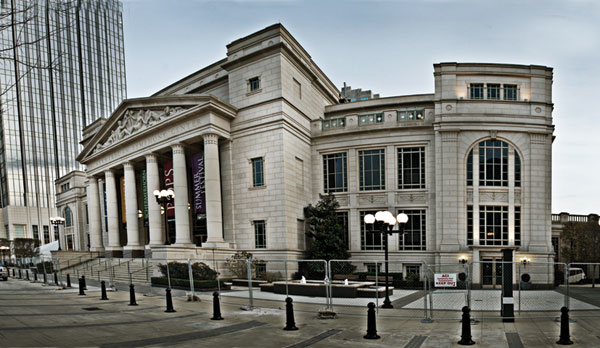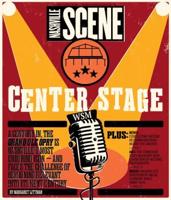The great muse of music must have been smiling on the Nashville Symphony Orchestra.
After a seven-month exile from the Schermerhorn Symphony Center following last spring's flood, symphony employees were all back in the concert hall on Dec. 16. That day, appropriately enough, was Beethoven's birthday.
Alan D. Valentine, the symphony's president, was tickled by the coincidence. But he was even more excited about his organization's significant recent accomplishments.
"We are reopening the Schermerhorn Symphony Center on schedule and under budget," says Valentine, clearly thrilled to be back in his old office at the concert hall. "And we're going to celebrate."
Indeed, the symphony will mark the reopening next week of the acoustically marvelous Schermerhorn — named for the orchestra's late music director Kenneth Schermerhorn — with a New Year's Eve performance reminiscent of the gala celebrations at Vienna's famed Musikverein. The orchestra will, of course, play an obligatory Strauss waltz or two — hey, after surviving a catastrophic flood, what symphony wouldn't want to play The Beautiful Blue Danube?
Internationally acclaimed violin virtuoso Itzhak Perlman will be on hand to play a few of Austrian composer Fritz Kreisler's light musical confections, as well as his signature piece, a concert paraphrase based on music from the score of Schindler's List. And to give the concert something of an American flavor, music director Giancarlo Guerrero will lead the orchestra in some of Leroy Anderson's syncopated arrangements.
Guerrero and his musicians had to overcome some big challenges during their displacement. In recent years, the ensemble had developed a national reputation for adventurous programming, especially of contemporary American music. That kind of ambitious music-making, however, had to be put on hold after the flood.
The problem was partly logistical. The orchestra, for instance, had planned to open its season with Gustav Mahler's mighty Symphony No. 8 in E-flat major (Symphony of a Thousand). But the substitute venue, the War Memorial Auditorium, was too small to accommodate that work's massive orchestral and vocal forces.
Similarly, Guerrero was going to juxtapose Beethoven's revolutionary Piano Concerto No. 5 in E-flat major, Op. 73 with music from Doctor Atomic, contemporary American composer John Adams' far-reaching opera about the Manhattan Project's principals. But Lipscomb University's Collins Alumni Auditorium, though intimate, wasn't the right acoustic space for Adams' dramatic score.
"We decided if we couldn't do justice to a particular piece, then we just wouldn't play it," says Guerrero. "Now that we're heading back to the Schermerhorn, we'll reschedule the Mahler, the Adams and anything else we missed."
The temporary loss of the Schermerhorn may have been frustrating and inconvenient, but Guerrero insists that the disaster had its positive side.
In particular, he says the ensemble's recent peripatetic existence, playing at Lipscomb one week and the Tennessee Performing Arts Center the next, was a great dress rehearsal for future national and even international tours.
"We got used to listening to ourselves in different acoustical settings," says Guerrero, "and we're now well-acquainted with the logistical challenges of moving large instruments around."
The Nashville Symphony plans to tour the East Coast in 2012. And it's a good bet that more tours may be in the offing, given the orchestra's flourishing recording career.
Guerrero's first recording with the orchestra, last year's Daugherty: Metropolis Symphony, was recently nominated for five Grammy Awards, including best classical album. Orchestras with successful recording catalogs often find it necessary to tour, in part because they often have more fans abroad than at home.
Valentine is all for touring. Still, in recent months, he's primarily been focused on his twofold goal: restoring the Schermerhorn, and taking precautionary measures to avoid — or at least mitigate — future flooding disasters.
By far, his biggest challenge has been managing the cash flow of a massive reconstruction project. Fortunately, the initial cost estimate proved to be high. The final price tag will be $39.6 million, not the initially reported $43 million. The costs of building supplies and construction have come down during the recession, Valentine says, hence the savings.
The symphony borrowed from its unrestricted endowment to help pay for the construction. Insurance and money from the Federal Emergency Management Agency will reimburse the symphony for most of its costs — but not all.
"I estimate we'll still have a gap of about $4 million, which is a lot of money that we will still have to raise," says Valentine.
It was widely reported after the flood that the symphony had lost its two Steinway concert grand pianos and the console to its Martin Foundation Concert Organ. But damage at the Schermerhorn went far beyond the loss of a few high-profile instruments.
A 5,000-square-foot slab of concrete floor beneath the stage crumbled under the pressure of floodwater. That foundation had to be removed and replaced with a new floor of concrete and reinforced steel.
The Schermerhorn's massive and complex heating and air-conditioning system — contained in the lower level — was a complete loss and had to be rebuilt.
The flood also destroyed the Schermerhorn's kitchen. Mark Blakeman, the symphony's vice president of orchestra and building operations and general manager, said the refurbished kitchen has been designed to survive possible future floods.
"We've fitted our large kitchen appliances with casters so they can be quickly wheeled to safety in the event of another flood," he says.
Similarly, the concert hall's stage lifts have been rewired to run on emergency power. If a future flood shuts down the Nashville Electric Service, the Schermerhorn will still be able to lift its pianos and other valuables out of harm's way.
Perhaps the symphony's most dire short-term loss, though, has been its audience. The symphony makes most of its new subscription sales during the months of May to September. Not surprisingly, new subscription sales this past year were particularly hard hit, says Valentine.
Still, the symphony's fiercely loyal longtime patrons countered that loss with vigorous subscription renewals. Ed Goodrich, a classical subscriber for the past 10 years, didn't hesitate to renew his subscription.
"I'd go hear the Nashville Symphony in an open field if I had to," Goodrich says.
Email editor@nashvillescene.com.






